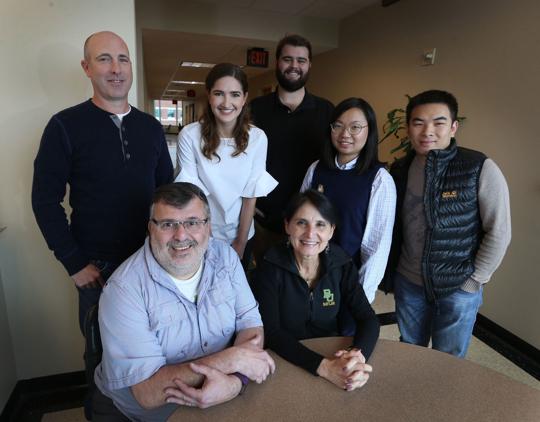Baylor Geosciences Professor to Receive International Award for Desert Research

Members of Baylor Geosciences Professor Steve Forman's research group: Top row (L to R) - Chris Dicky (undergraduate), Tori Todd (graduate student), Connor Mayhack (graduate student) Zequn Wu (graduate student) and Liang Peng (graduate student). Front row (L to R) - Dr. Steve Forman and Liliana Marin (geosciences instrumentation specialist).
Media Contact: Lori Fogleman, Baylor University Media and Public Relations, 254-710-6275
Follow us on Twitter: @BaylorUMedia
WACO, Texas (Sept. 17, 2019) – Steven L. Forman, Ph.D., professor of geosciences and director of the Geoluminescence Dating Research Laboratory at Baylor University, will receive the international Farouk El-Baz Award for Desert Research from the Geological Society of America, becoming only the 21st scientist to receive the award. The GSA will present Forman with the award during the organization’s meeting Sept. 23 in Phoenix, Arizona.
Established in 1999 by the GSA Foundation and administered by the GSA’s Division of Quaternary Geology and Geomorphology, the Farouk El-Baz Award is given annually to a scientist in recognition of an outstanding body of work in the field of desert research and to encourage young scientists to strive for excellence in desert research. Renowned space scientist and geologist Farouk El-Baz, Ph.D., Research Professor and Director of the Center for Remote Sensing at Boston University, contributed the initial endowment for the award.
“I have the humble honor of receiving this International Award for Desert Research from GSA by the good tidings of colleagues from North and South America and China,” Forman said. “This award recognizes the research I have completed with a bevy of colleagues, post-doctoral scholars and graduate students, and many share in this recognition, particularly the department of geosciences at Baylor. I am fortunate to work with such intellectually open and pluralistic colleagues from many countries, which propels research and discovery.”
Forman will receive the award for his research deciphering the history of eolian (wind) activity, including dune movement and lake level changes in North and South America, China, Russia and Africa, which are bellwethers of climate change.
“A keystone of this research is a better understanding of the response of arid and semiarid landscapes, with climate change, in the recent past, currently and into a greenhouse gas-dominated future,” Forman said. “We are currently witnessing an expansion of deserts globally with 20th and 21st century global warming.”
The award focuses on warm deserts rather than polar deserts, since desert landforms have not received as much attention by geologists as other types of landforms, El-Baz said. “We need to encourage and reward arid land studies,” he said.
“Dr. Steve Forman is a world-renowned researcher with research interests centered on gaining new understanding of the progression and mechanisms of environmental and climate change in the past 250,000 years of Earth’s history,” said Steven G. Driese, Ph.D., professor and interim chair of geosciences in Baylor’s College of Arts & Sciences and associate dean for research in the Graduate School.
“Dr. Forman has dedicated his career to the study of Quaternary geomorphic and climatic change from deserts to the Arctic, and it is in deserts and semiarid regions where his research has been most impactful,” he said. “With more than 9,300 citations (according to Google Scholar), Dr. Forman’s stellar publication record documents his wide-reaching and collaborative research endeavors. Dr. Forman is deserving of this award for several reasons, including his extensive research related to eolian activity and documentation of past droughts.”
ABOUT BAYLOR UNIVERSITY
Baylor University is a private Christian University and a nationally ranked research institution. The University provides a vibrant campus community for more than 17,000 students by blending interdisciplinary research with an international reputation for educational excellence and a faculty commitment to teaching and scholarship. Chartered in 1845 by the Republic of Texas through the efforts of Baptist pioneers, Baylor is the oldest continually operating University in Texas. Located in Waco, Baylor welcomes students from all 50 states and more than 90 countries to study a broad range of degrees among its 12 nationally recognized academic divisions.
ABOUT THE COLLEGE OF ARTS & SCIENCES AT BAYLOR UNIVERSITY
The College of Arts & Sciences is Baylor University’s oldest and largest academic division, consisting of 25 academic departments and seven academic centers and institutes. The more than 5,000 courses taught in the College span topics from art and theatre to religion, philosophy, sociology and the natural sciences. Faculty conduct research around the world, and research on the undergraduate and graduate level is prevalent throughout all disciplines. Visit www.baylor.edu/artsandsciences.